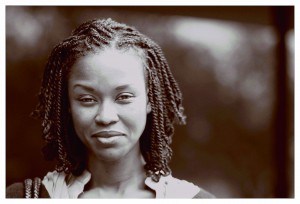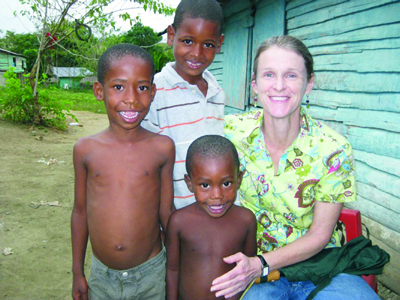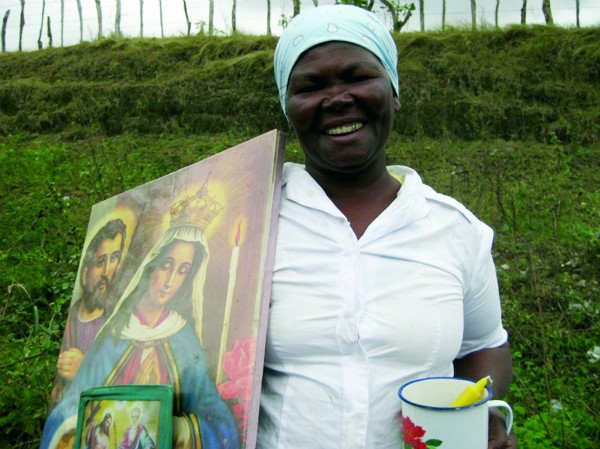Liberal Arts professors and students explore the next steps for Haiti
The images of mass devastation, suffering, loss and chaos will forever remain with Suzanne Edwards after her trip to Haiti.
On Jan. 12, less than an hour before the 7.0 magnitude earthquake devastated the nation, Edwards, a University of Texas at Austin senior majoring in journalism and Chinese, and her group of Houston Rotarians, arrived in Haiti to embark on a humanitarian project at Diquini Hospital near Port-au-Prince.
While driving into the city from the airport, Edwards’ trip quickly spiraled into an unimaginable nightmare. “Fortunately the earthquake hit right while we were driving in an open field,” Edwards says. “At first I didn’t even think it was an earthquake because the car was rattling like it had some sort of mechanical problem. But as we drove closer to downtown, we started to see how bad the damage really was.”
That night, Edwards and her team of Rotarians tirelessly tended to the needs of the wounded, praying with them, holding their hands and administering what little medical aid they had to offer.
“The darkness seemed like a blessing because we couldn’t fully see the trauma in front of us,” Edwards says. “Whenever I think of that night, I feel pulled back to the hospital, that’s why I’m so aggressive about going back.”
A similar call to duty has in inspired several other professors and students in the College of Liberal Arts who are dedicating themselves to Haiti’s disaster relief and making sure other Texans and Americans continue to remember the plight of the Haitians.
Hundreds of students and faculty have rallied for donations at campus-wide events, including Jemima Pierre, assistant professor of anthropology, who discussed long-term recovery efforts at a Jan. 22 benefit sponsored by the Teresa Lozano Long Institute of Latin American Studies and the John L. Warfield Center for African and African American Studies. And a number of liberal arts students participating in the university’s Hold Up for Haiti fundraiser helped raise more than $55,000.

In January, Pierre visited Port-au-Prince with a delegation of scholars, journalists and community activists to support long-term relief efforts and community empowerment. In collaboration with members of the Haitian health relief nonprofit Fondation Avenir, leaders of nongovernmental organizations and Haitian Americans working and living in Haiti, the delegation evaluated relief efforts for the ravaged city. When she returned to the university, she gave a report from her trip at a Feb. 2 conference titled “The Natural/Social Disaster in Haiti.”
A native of Port-au-Prince, Pierre believes the most effective way to support Haiti is to focus on long-term stability and development.
“UT has numerous resources to help the aid effort in Haiti—from providing social mapping research teams to potentially working to establish an educational station in one of its cities,” says Pierre, who is also affiliated with the John L. Warfield Center for African and African American Studies. “In particular, there is a need for more permanent housing, especially in light of the upcoming rainy season.”
Haiti’s hope for recovery also relies heavily on rebuilding efforts from other countries, Pierre says. “In addition to general human compassion, the U.S. and other countries—particularly Canada, France and other European nations—have a very intimate relationship with Haiti,” Pierre notes. “They have been extremely influential in Haitian national affairs. Their involvement in Haiti should not be considered only in terms of compassion; it should be thought of as a responsibility to the people of Haiti for past and contemporary treatment.”
A Neighbor in Need
Of all the countries extending relief efforts to Haiti’s capital city, its neighbor, the Dominican Republic, responded the quickest, according to a Jan. 19 report in TIME. In a remarkable gesture of neighborliness, the Dominican Republic opened up its border to refugees and emergency relief from other countries. Less than two days after the earthquake, Dominican Republic President Leonel Fernandez visited Haiti and announced his country’s support for the recovery effort.

Given the tensions and tumultuous history between the two nations, the Dominicans’ efforts symbolize an expression of solidarity, according to Barbara Bullock, professor of French and Italian, and Almeida Jacqueline Toribio, professor of Spanish and Portuguese.
The two nations share the island of Hispaniola, but seemingly little else. Unlike its wealthier neighbor with lush green landscapes and architecturally sounder buildings, Haiti is desperately impoverished, overpopulated and severely deforested.
Every summer, Bullock and Toribio travel to Hispaniola to study the structure of the Spanish spoken by the Dominicans and the Creole language spoken in rural border towns. From their fieldwork, they’ve found that the Haitians are oppressed by racial tensions with the Dominicans and by border security concerns.
The linguists hope the international spotlight on Haiti’s time of need will help bury those racial tensions and bridge the economic gap between the two countries.
“Even before this most recent disaster, Haitians crossed into the Dominican Republic out of dire necessity,” says Toribio, a native of the Dominican Republic. “Their needs will be greater now. However, there is a solution: The organizers of the international rebuilding effort should provide meaningful jobs to Haitians within their own country. This will curb the exodus from Haiti to the Dominican Republic and other Caribbean destinations and, more significantly, give Haitians a sense that they have some real power in their own country and in its future.”
Bullock and Toribio have found that many Dominicans treat the Haitians as second-class citizens and even perpetuate myths about Haitian cannibalism. These judgments are largely based on the Haitians’ darker skin color and “Haitianized” Spanish.
“In examining this type of linguistic profiling, we’ve shown that Dominicans perceive—and stereotype—the speech of any rural, uneducated border resident as Haitian and black even when the speaker is, in actuality, Dominican and white,” Toribio notes.
According to Bullock, resentment toward the dark-skinned Haitians was fueled by the notorious Dominican dictator Rafael Leónidas Trujillo, who ordered the massacre of an estimated 30,000 Haitian migrants living in the Dominican Republic in 1937.
“Much of this anti-Haitian sentiment does not necessarily have a deep history,” Bullock says. “Instead, it harkens to the era of the Dominican dictator, Trujillo, who deliberately tried to erase all things Haitian and African from the Dominican psyche.”
Bullock and Toribio acknowledge that their next trip to Hispaniola will be marred by the absence of familiar faces. “We fear many of the Haitians that we have interviewed in the past will have disappeared,” Bullock says. “We may never know whether they returned to assist their families and their country or whether they, too, perished.”
Bullock and Toribio are helping the relief effort by raising funds for Partners in Health, a nonprofit health organization recognized by NBC News as one of the top three relief organizations for Haiti.
A Test of the World’s Conscience
Jean Belleroche also knows that he will never again be greeted by many of his friends and family members when he returns to Port-au-Prince. But even as he grieves for his ravaged country and lost loved ones, he believes that with the right leadership, Haiti can once again be “the pearl of the Caribbean.”
A native of Haiti and graduate student in the Department of French and Italian, Belleroche urges leaders throughout the world to redress the problems Haiti faced before the earthquake, such as inefficiency in the government and two centuries of poverty.
“The international community, the Haitian government and politicians should finally listen to the Haitian people,” Belleroche says. “We must not focus on the past, but in unity we need to move forward. In regards to the country’s constitution, we should work with the current government for the sole benefit of Haiti and its unfortunate, but courageous people. There is hope for improvement: the sun of abundance will shine again on Haiti.”
A former journalist and radio talk show host in Haiti, Belleroche feels a close bond with the people of Haiti and the country itself.
“My audience always counted on me and my team to inform them of what’s going on in the country and around the world,” says Belleroche, who also taught French and Haitian literature in high schools in Port-au-Prince. “We talked about politics, literature, love and music. They waited for my shows to come on, and I enjoyed connecting with them.”
He believes that with education, faith and hope, the Haitians will overcome the tragedy, rebuild and move on to a better future.
A Call to Duty
With 200,000 people dead, another 300,000 injured, and years of rebuilding in store, Haiti’s mass devastation is far from over.
Around the world, onlookers feel helpless as hundreds of thousands of Haitians struggle for survival. But after her January trip turned into a relief mission, Suzanne Edwards is not content to stand by.
The sense of duty to the overwhelming number of Haitians left stranded and injured in the rubble made it hard for Edwards to leave Haiti. In March, she returned to Haiti with members of River Bend Church in Austin. They were trained in first aid and had medical supplies in tow.
A freelance news journalist and fledgling documentarian, Edwards initially planned on documenting her experience through blogs, short videos and photographs. But as soon as she encountered the horrifying scene at Diquini Hospital, she had to choose between taking footage and helping the wounded.
“I felt like I needed to film the horrifying scene outside, but my heart wasn’t in it,” Edwards recalls. “It was kind of a crash course in disaster coverage. I learned that there’s a balance as a news journalist between documenting a crisis situation and knowing when to stop rolling footage to lend a helping hand.”
Despite Edwards’ disturbing memories from her first night in Haiti, she said she will forever be inspired by the strength and spirit of the people of Haiti.
“The Haitians have a wonderful saying, ‘you’ve walked in the dust with me,’” Edwards says. “That saying has left an imprint on my heart, and it will stay with me when I approach future projects.”
